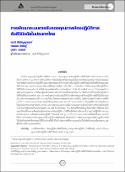บทคัดย่อ
สำนักมาตรฐานห้องปฏิบัติการได้จัดทำระบบการรับรองคุณภาพห้องปฏิบัติการรังสีวินิจฉัย ในปีงบประมาณ 2562 เรียกว่า MOPH X-ray 2562 การศึกษานี้เป็นการวิจัยเชิงพัฒนามีวัตถุประสงค์เพื่อกำหนดขั้นตอนดำเนินงานที่เหมาะสมและวิเคราะห์ผลการนำระบบงานไปใช้ดำเนินการรับรองระบบบริหารคุณภาพห้องปฏิบัติการรังสีวินิจฉัย โดยใช้สถิติพรรณนาและสถิติ one-way ANOVA กรอบแนวคิดการวิจัยประกอบด้วย 3 ส่วน คือ (1) การดำเนินการจัดทำมาตรฐานห้องปฏิบัติการรังสีวินิจฉัย ประกอบด้วย 10 หัวข้อใหญ่ และจัดทำเป็นแบบประเมินผล 114 ข้อ (2) การจัดทำระบบการรับรอง โดยมีการจัดทำเอกสารคุณภาพ การพัฒนาผู้ตรวจประเมิน และการกำหนดขั้นตอนดำเนินงาน เพื่อให้บริการรับรองห้องปฏิบัติการรังสีวินิจฉัยในประเทศไทย และ (3) การนำระบบการรับรองไปให้บริการรับรองคุณภาพห้องปฏิบัติการรังสีวินิจฉัยจำนวน 245 แห่ง ครอบคลุมสถานบริการ 5 กลุ่ม ได้แก่ โรงพยาบาลชุมชน โรงพยาบาลทั่วไป โรงพยาบาลศูนย์ โรงพยาบาลสังกัดกรมวิชาการกระทรวงสาธารณสุข และสังกัดกรุงเทพมหานคร ผลการตรวจประเมินพบว่า ห้องปฏิบัติการส่วนใหญ่มีความไม่สอดคล้องกับมาตรฐานไม่เกิน 10 ข้อ ผลการตอบแบบสอบถามเพื่อประเมินผลความพึงพอใจของการรับรองห้องปฏิบัติการตามมาตรฐานกระทรวงสาธารณสุข 172 แห่ง คิดเป็นร้อยละ 70.2 มีความพึงพอใจในระดับมากที่สุด ถึงร้อยละ 88.0 และเปรียบเทียบความพึงพอใจเฉลี่ยตามประเภทห้องปฏิบัติการรังสีวินิจฉัยที่ขอการรับรองทั้ง 5 กลุ่ม โดยใช้สถิติ one-way ANOVA พบว่าความพึงพอใจของห้องปฏิบัติการไม่แตกต่างกัน (p > 0.05) สรุป ระบบการรับรองที่จัดทำขึ้นสามารถนำไปใช้ในการรับรองระบบบริหารคุณภาพห้องปฏิบัติการรังสีวินิจฉัย เพื่อส่งเสริมการพัฒนาระบบคุณภาพห้องปฏิบัติการรังสีวินิจฉัยทั่วประเทศ ซึ่งจะส่งผลให้ผู้รับบริการได้เข้าถึงบริการสุขภาพที่มีความปลอดภัย มีประสิทธิภาพและมีมาตรฐาน และผู้ให้บริการมีความปลอดภัยด้วย
บทคัดย่อ
The Bureau of Laboratory Quality Standards of the Ministry of Public Health (MOPH) had established a quality certification system for diagnostic radiology laboratory (DRLab), namely MOPH X-ray 2562, since 2019. This study aimed to determine the appropriate processes and to evaluate the implementation of the established certification system by using descriptive statistics and one-way ANOVA. The research included three parts: (1) the creation of DRLab standards with 10 main topics containing 114 checklist items; (2) the development of a certification system, including quality documents, assessor training, and operational procedures in order to provide certification services for DRLabs in Thailand; (3) the implementation of the certification system with 245 DRLabs of 5 provider groups (community hospitals, general hospitals, regional hospitals, academic hospitals under Ministry of Public Health, and hospitals of the Bangkok Metropolitan Administration). Sixty-three percent of the total DRLabs (245) were found to have nonconformities of less than 10 requirement items. The satisfaction questionnaire revealed that 70.2% were satisfied with the highest satisfaction rate being 88.0%. The average satisfaction levels of DRLabs among 5 groups showed no significant difference (p > 0.05 by one-way ANOVA). The established certification system could be applied to certify diagnostic radiology laboratories throughout the country to promote quality system of safe, efficient, and standardized services to both recipients and providers.


